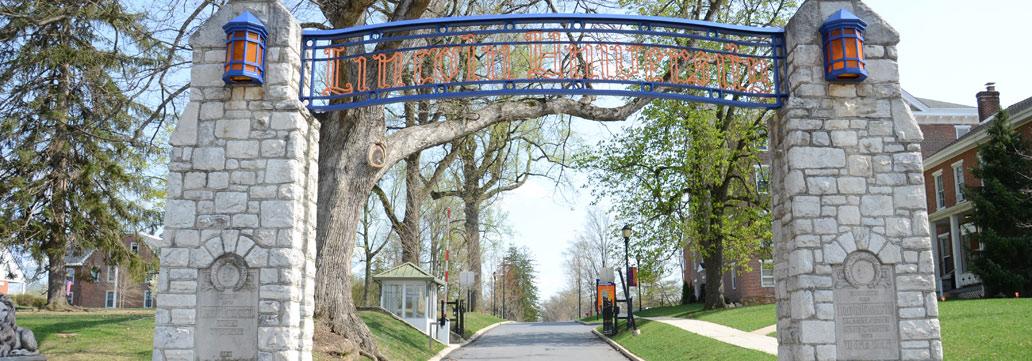
Main Campus - Chester County
Visit our 56–building main campus, an oasis amid the rolling farmlands and wooded hilltops of southern Chester County in Pennsylvania. Even in our rural setting, we are within about an hour of several major cities: 45 miles from Philadelphia; 55 miles from Baltimore; and in Delaware, 25 miles from Wilmington and 15 miles from Newark. Our unique learning environment is equipped with state-of-the-art facilities, vibrant landscaping and pedestrian-friendly accessibility from numerous sections of the campus.
Campus Landmarks
One of the most visible landmarks on campus is the Alumni Memorial Arch, located at the entrance to the university. The arch was dedicated by President Warren G. Harding to honor the Lincoln men who served in World War I. The Mary Dod Brown Memorial Chapel is at the center of campus religious activities. This Gothic structure was built in 1890 and contains a 300-seat main auditorium and a 200-seat fellowship hall. The Frederick Douglass Statue, a monument to the great abolitionist and orator, was donated by Lincoln alumni and brothers, Clyde Atwell ’37, Selwyn R. Atwell ’41 and Dr. George L. Atwell ’48 and originally unveiled and located at the center of campus during Homecoming week in October 1989. In 2011, the statue was relocated to a walkway between Frederick Douglass, McRary and Ashmun residence halls just beyond the campus Quad and the Thurgood Marshall Living Learning Center.
Residence Halls
There are 15 residence halls that can accommodate more than 1,600 students. The dormitories range from small dorms such as Alumni Hall, built in 1870; and Amos Hall, built in 1902, to the coed 400-bed apartment-style living (ASL) suites built in 2005.
Academic & Administrative Buildings
The University’s academic and administrative buildings range from historic structures like Vail Hall, built in 1899 and expanded in 1954, which served as the library until 1972 and later the Office of the President, but now houses the Office of Academic Affairs as well as other administrative offices to the state-of-the- art Ivory Nelson Center for the Sciences, which includes the biology, chemistry, physics and math departments. That $40.5 million, four-story, 150,000-square-foot science and technology building, completed in December 2008, includes a range of classrooms, lecture rooms, laboratories and offices.
Athletic, Cultural & Entertainment-Oriented Buildings & Facilities
In addition to Manuel Rivero Hall, the athletic and recreation center at Lincoln University, which houses the main gymnasium seats 2,500 for athletic events and pep rallies, a separate full-size auxiliary gymnasium, Olympic-size swimming pool, training room facilities, wrestling room, and eight-lane bowling alley, the University’s athletic, recreation and entertainment facilities underwent an expansion in recent years. A new 2,350 seat Lincoln Lions football stadium opened with ticket booth, concession stands, press box, a VIP suite, a separate locker room, and storage facilities as well as added a separate practice field with Field Turf II near our new Health & Wellness Center, where six new lighted Tennis Courts are located. New baseball and softball fields are also adjacent to the football stadium. The $28 million 105,00 sq. ft. Health and Wellness Center, which opened in September 2012, contains basketball courts, locker rooms, classrooms, three-lane track, rock climbing wall, health clinic and healthy eating café. The Student Union Building (SUB), also renovated, contains the campus store, café, two new television studios, and a radio studio, postal services, and multipurpose rooms. Both the SUB and the Thurgood Marshall Living Learning Center, which houses the cafeteria and a KFC Express, are the centers for campus social and meeting activities. In April 2014, the Danjuma African Art Center, established through a generous $1 million gift from retired General Theophilus Y. Danjuma, a Nigerian Jukun soldier, politician and businessman, houses select installations of the university’s extensive collection of African art and artifacts. In addition, the university’s International Cultural Center (ICC), a $26.1 million building which houses a 1,049-seat theater and conference facility, art gallery, reception hall and administrative offices, including the Office of the President. The locale frequently hosts concerts, weekly convocations, conferences, meetings and receptions.